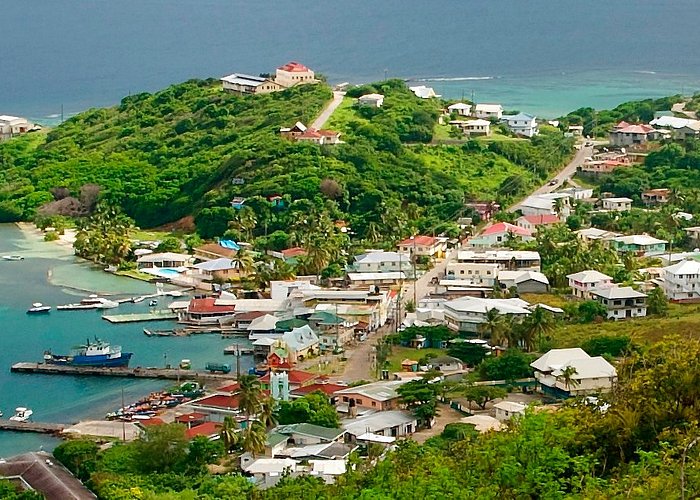St Vincent and the Grenadines has a typical Caribbean history, except that it was one of the last places to be settled by European colonizers due to the resistance of the natives, who remained extremely proud of their land. But even so, the riches of the ‘Spice Islands’ were too lucrative to be left alone, and eventually the country came into British hands by the 18th century. Since then St Vincent and the Grenadines has encountered steady growth until it finally claimed independence in 1979. Today, the country is reliant on banana exports and tourism to fuel its economy.
History
The island of St Vincent was one of the last countries to be settled in the Caribbean, since colonization was prevented by the native people who held onto their land. The indigenous peoples of St Vincent and the Grenadines were the Caribs, whom the region is now named after. They called St Vincent Hairouna, meaning the ‘Land of the Blessed’, which may still today be a fitting description for the wonderful tropical island. Today, the nation’s leading brand of beer is called Hairouna.
By 1719, French settlers of nearby Martinique encroached on the island to begin growing coffee, tobacco, sugar, and other crops to export back to Europe for the then lucrative market. The British Empire had a stronghold in the region by that time, and in 1763 the French officially ceded the island to them. The French recaptured St Vincent in 1779, but then four years later the British regained control.
All was not well though, since between 1783 and 1796 the native Caribs resisted British control until the uprising was quashed. In 1797 more than 5,000 black Caribs were deported to the island of Roatan, now part of the nation of Honduras. Today, these English speaking descendants are known as the ‘Garifuna’. Many black Caribs still exist in St Vincent and the Grenadines today, dating back to when the indigenous population intermarried with slaves of African descent.
Slavery was abolished in 1834, resulting in labor shortages on the plantations. Declining prices and a fragile commodity market at the time also saw problems for St Vincent. From the 1840s until the 1890s many Portuguese and Indian workers were transported to the island to increase productivity although history and a changing global economy would result in the crop export market failing. Agricultural exports are still important for St Vincent and the Grenadines, today dominated by banana production.
Tourism is extremely important for St Vincent and the Grenadines, and is the country’s second main industry but unemployment still remains high in the country, with between 15-20 percent of the population jobless. Since the country is still reliant on the growth and export of a single crop, the banana, it is vulnerable to natural catastrophes which occasionally occur in the island, severely limiting the economy. Hurricanes in 1980 and 1987 virtually wiped out the entire banana and coconut plantations. Storms in 1998 and 1999 also severely damaged crop outputs. In general, though, citizens here enjoy a good standard of living, and it is considered a lower-middle income world economy. St Vincent and the Grenadines gained independence from British rule in 1979.
Culture
The alluring sounds of Caribbean music awake you like a distant dream come true in St Vincent and the Grenadines. Steel pan bands are the major traditional output here, pumping out there upbeat tunes that enlightens the dancing crowd. Also popular in St Vincent and the Grenadines is calypso, reggae, and soca. You can hear the music at many resort entertainments held nightly in the high season, or head to the annual carnival for the biggest party.
Cricket and soccer are also close to the hearts of the people of St Vincent and the Grenadines, a heritage left behind by the British. The country is part of the regional West Indian Cricket (known colloquially as the ‘Windies’), and they are proud of their successes on the international stage. You can go to the cricket ground in Kingstown to watch the sport in action.
Saint Vincent, Land so beautiful,
With joyful hearts we pledge to thee
Our loyalty and love and vow
To keep you ever free.
What e’er the future brings,
Our faith will see us through.
May peace reign from shore to shore,
And God bless and keep us true.
Hairoun, Our fair and blessed Isle,
Your mountains high, so clear and green,
Are home to me, though I may stray,
A haven, calm, serene.
What e’er the future brings,
Our faith will see us through.
May peace reign from shore to shore,
And God bless and keep us true.
Our little sister islands are
Those gems, the lovely Grenadines,
Upon their seas and golden sands
The sunshine ever beams.
What e’er the future brings,
Our faith will see us through.
May peace reign from shore to shore,
And God bless and keep us true.

Mustique Blues Festival
This St Vincent festival is the brainchild of London blues singer Dana Gillespie, and has been running since 1996. It is held over two weeks in January and February on the island of Mustique, although it does visit the island of Bequia for one night in the middle of festival. Since its inception it has been growing in popularity, and is a great place to hear some blues and roots music.
Bequia Easter Regatta
This five-day boat race takes place over Easter on the island of Bequia. It attracts many international professional and amateur sailors who compete in the Caribbean Sea surrounding the island. It is quite a spectacle to watch, and the final day sees huge celebrations going into the night.
Vincy Mas
This is a typical Caribbean festival filled with parades and pageants, and dancing and music at street parties. It is held over two weeks at the end of June, and the beginning of July annually, and is St Vincent’s most well-known festival.
National Dance Festival
Many performances are held during the month of September to showcase traditional and other dance styles. Shows are put on by schools, community groups and professional dance companies. You can expect to see modern, traditional, creative folk and ballroom dances.
Independence Day
This is held on October 27 every year to celebrate the formation of St Vincent and the Grenadines as a sovereign nation in 1979. Many people are proud of this and use the public holiday to celebrate in public at community events.
Nine Days Festival
As the name may suggest, this festival is held over nine mornings, in the run-up to Christmas Day. It reflects an indigenous culture mixed with Christianity, and is unique to St Vincent and the Grenadines. You will be reminded exactly of where you are as you are woken to the uplifting sounds of traditional steel pan music played at pre-dawn street concerts. Later in the day fêtes and fairs are held in towns and villages around the islands.






